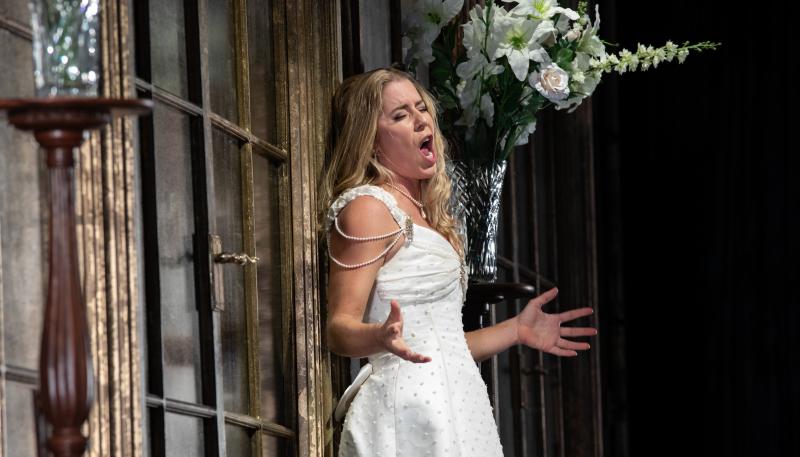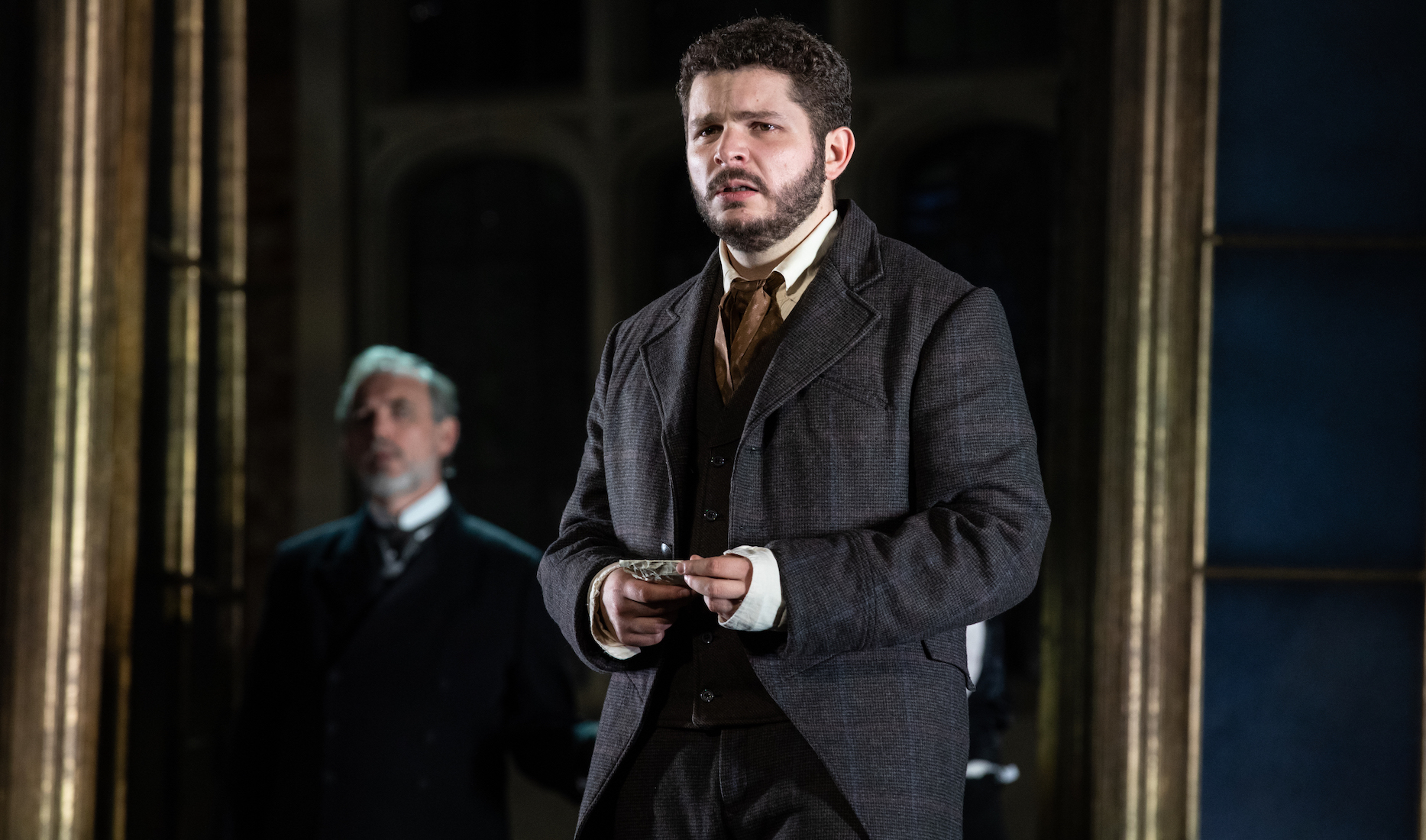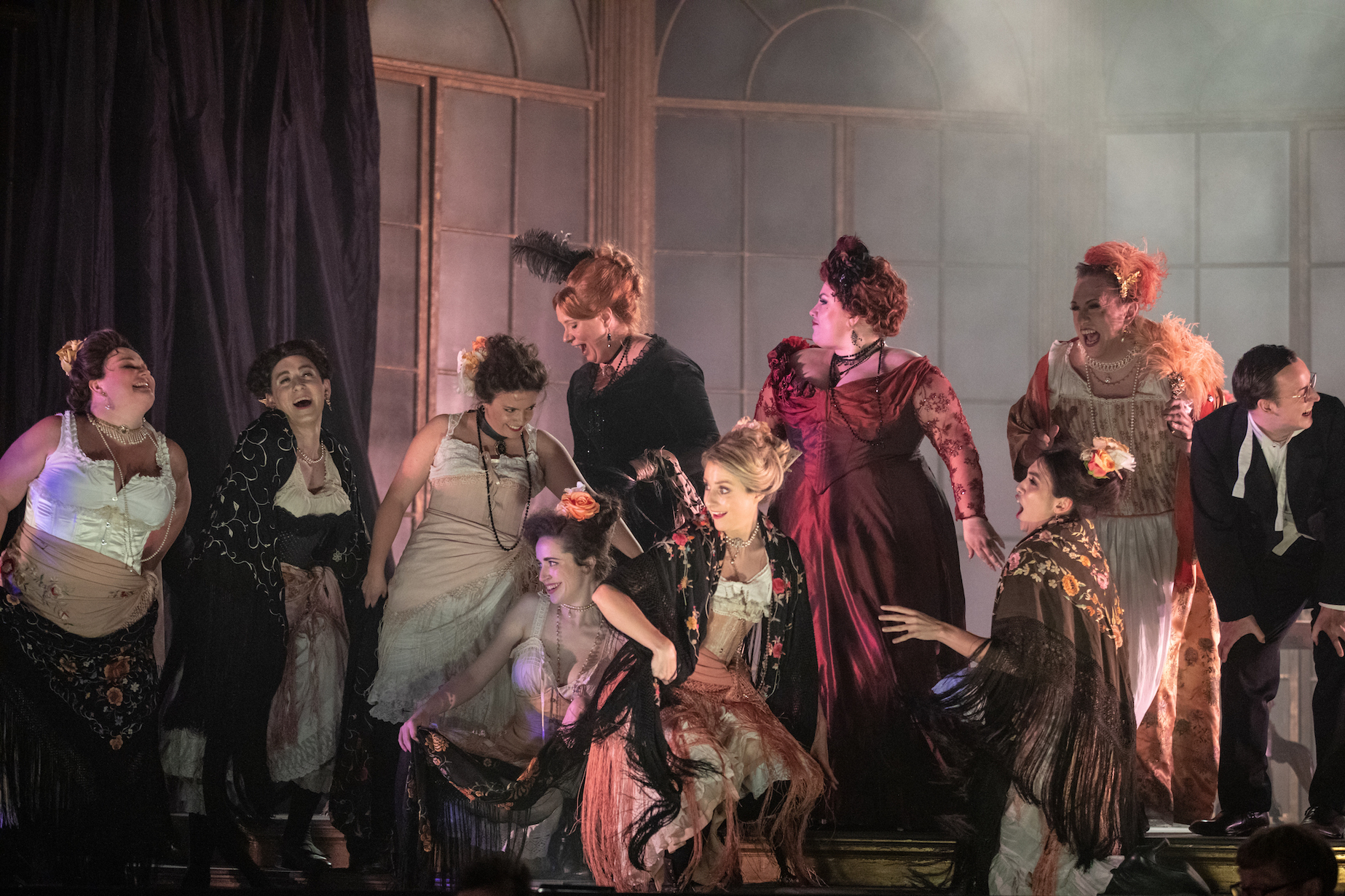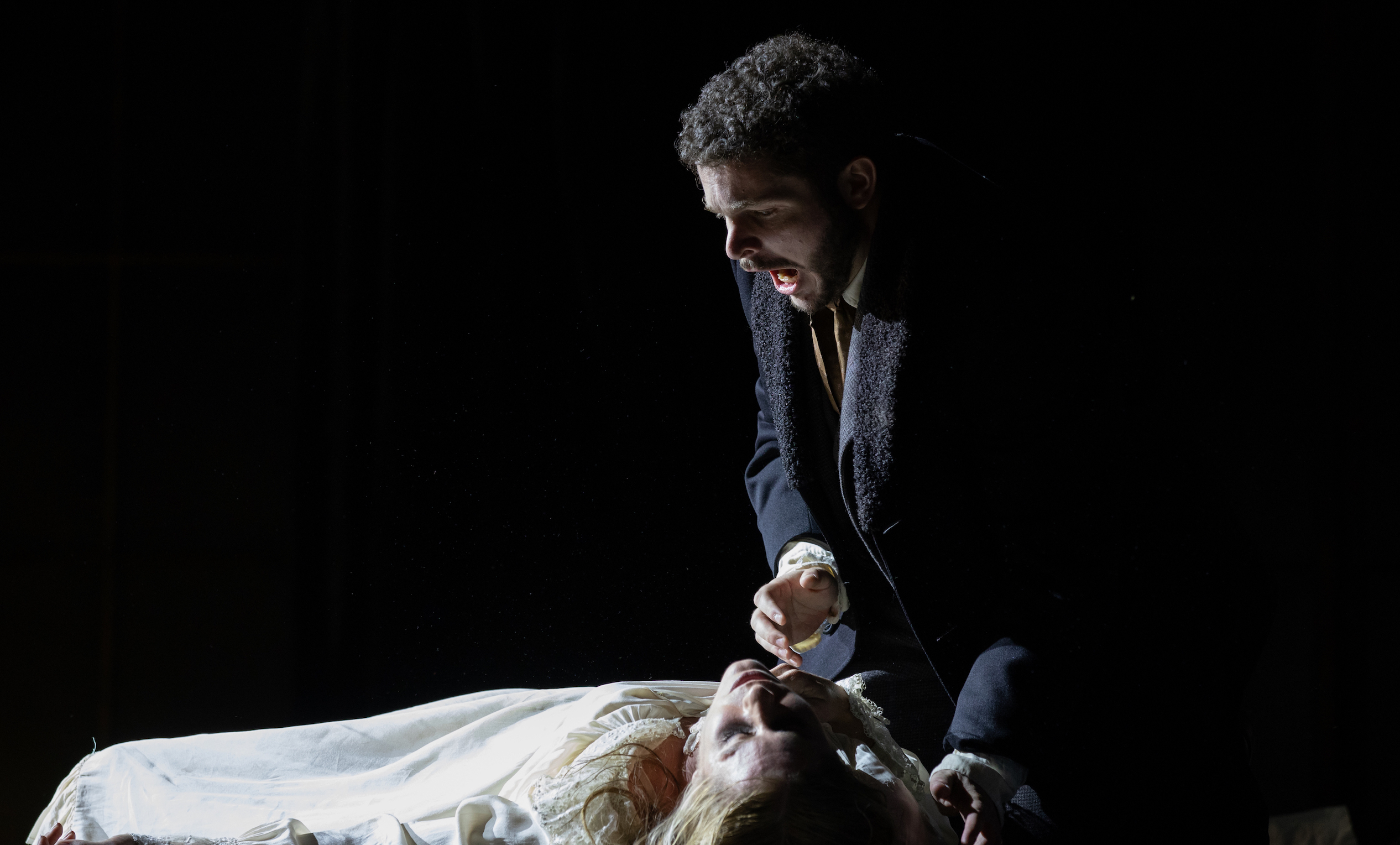La traviata, Opera Holland Park review – a revival in rude health | reviews, news & interviews
La traviata, Opera Holland Park review – a revival in rude health
La traviata, Opera Holland Park review – a revival in rude health
Rodula Gaitanou's production roars back with splendid singing and emotional conviction

Loudly and painfully, the consumptive Violetta wheezes before we hear a single note. Her pitiful gasping for the breath that deserts her precedes the prelude to Opera Holland Park’s La traviata; the same effect ushers in Act Three.
What Verdi’s pre-verismo tragedy of the 1850s Paris demimonde demands is a cast of singer-actors who can make its familiar agonies and ecstasies ring utterly true. Three years on, Gaitanou’s principals – Lauren Fagan’s Violetta, Matteo Desole’s Alfredo, Stephen Gadd’s Germont – return to the remodelled and socially distanced Holland Park stage in finer voice than ever. The result is a luminous, heartfelt and strongly sung revival that has only gained in impact after the world-changing emergency that compelled James Clutton’s company into a 663-day break before its new season began last week.
 If La traviata foregrounds a woman’s loss of voice, the stifling of her breath and agency, then the pain of social distance also drives the plot. Behind the fleeting intimacies of the Parisian courtesan’s role lie the chasms of stigma and contempt that will divide Violetta from her beloved Alfredo (pictured above: Matteo Desole with Stephen Gadd) at the stern bidding of his father, Giorgio Germont. Although the OHP chorus in their Toulouse Lautrec-like finery make merry with the close-contact whirls and huddles of the party scenes, what strikes you most about Cordelia Chisholm’s set – stretched out over the wide playing area – is the sense of yawning apartness and separation. The scenery gives visual expression to the gulfs that keep Violetta from Alfredo, and Violetta herself from the dream of freedom she clutches at in the joyful but doomed coloratura leaps of Sempre libera. Even the audience, poised on our isolated clusters of chairs in a venue that must operate at 40 per cent capacity, feels a little remote – until, in the final act, the action suddenly moves from behind the orchestra to in front.
If La traviata foregrounds a woman’s loss of voice, the stifling of her breath and agency, then the pain of social distance also drives the plot. Behind the fleeting intimacies of the Parisian courtesan’s role lie the chasms of stigma and contempt that will divide Violetta from her beloved Alfredo (pictured above: Matteo Desole with Stephen Gadd) at the stern bidding of his father, Giorgio Germont. Although the OHP chorus in their Toulouse Lautrec-like finery make merry with the close-contact whirls and huddles of the party scenes, what strikes you most about Cordelia Chisholm’s set – stretched out over the wide playing area – is the sense of yawning apartness and separation. The scenery gives visual expression to the gulfs that keep Violetta from Alfredo, and Violetta herself from the dream of freedom she clutches at in the joyful but doomed coloratura leaps of Sempre libera. Even the audience, poised on our isolated clusters of chairs in a venue that must operate at 40 per cent capacity, feels a little remote – until, in the final act, the action suddenly moves from behind the orchestra to in front.
Stage left, Violetta’s curtained chamber serves as the cocoon for her bliss and agony in Acts One and Three. In Act Two it transforms into the rural hideaway where Germont père arrives to compel the “fallen woman” to give up his son for the honour of his spotless daughter and family – and the survival of an entire patriarchal order. Stage right, an extended stretch of mirrors and doors serves as public stage for showdowns, soirées and balls (pictured below): the sites of costume, performance and pretence. Gaitanou makes the most of the almost panoramic vistas and racetrack lengths the long, shallow set permits her. In place of static close-ups, the singers range far and wide over these expanses. Germont’s fervent Act Two entreaties to Alfredo to recall his family and homeland (Di Provenza il mar) almost become a long-distance chase.
 So this free-roaming Traviata, under a Holland Park canopy open at the sides to the impromptu choral contributions of peacocks and parakeets, sometimes feels more of a wide-angled social snapshot of 19th-century Paris than an intense, confined chamber drama. In these semi-al fresco conditions, the performances have to supply the sort of intimacy and engagement that can abolish distances. That they certainly do. Warmly assured, forceful but never without that underlying fragility, Lauren Fagan’s Violetta manages the tricky shift from the coloratura high jinks of the opening scenes to the darker, brooding colours of the later acts. If a few of the early top notes tended to drift off into the wide open spaces, her confrontations with Germont and deathbed defiance saw her in absolutely commanding – and extremely moving – form. It’s always hard to attempt to hear, say, Addio, del passato as if for the first time, but Fagan has all the truthful artistry, and strength across her generous soprano span, to strip the crust of routine from such moments. And, when Alfredo and Violetta at last emerge from behind to band to sing (almost) at our feet, it makes the transgressive power of their love thrillingly actual. As her tubercular body fails, her voice acquires an eerie glamour and grandeur. That is La Traviata’s essential suspension of disbelief, and a tough trick to make work unless, like Fagan, the voice has a fully characterised finesse to match its fate-defying force. As it does, for instance, in the duet Parigi, o cara.
So this free-roaming Traviata, under a Holland Park canopy open at the sides to the impromptu choral contributions of peacocks and parakeets, sometimes feels more of a wide-angled social snapshot of 19th-century Paris than an intense, confined chamber drama. In these semi-al fresco conditions, the performances have to supply the sort of intimacy and engagement that can abolish distances. That they certainly do. Warmly assured, forceful but never without that underlying fragility, Lauren Fagan’s Violetta manages the tricky shift from the coloratura high jinks of the opening scenes to the darker, brooding colours of the later acts. If a few of the early top notes tended to drift off into the wide open spaces, her confrontations with Germont and deathbed defiance saw her in absolutely commanding – and extremely moving – form. It’s always hard to attempt to hear, say, Addio, del passato as if for the first time, but Fagan has all the truthful artistry, and strength across her generous soprano span, to strip the crust of routine from such moments. And, when Alfredo and Violetta at last emerge from behind to band to sing (almost) at our feet, it makes the transgressive power of their love thrillingly actual. As her tubercular body fails, her voice acquires an eerie glamour and grandeur. That is La Traviata’s essential suspension of disbelief, and a tough trick to make work unless, like Fagan, the voice has a fully characterised finesse to match its fate-defying force. As it does, for instance, in the duet Parigi, o cara.
Matteo Desole’s Alfredo boasts everything a Traviata buff could want: genuine bel canto refinement, warmth and richness above and below, and a dramatic flexibility that allows him to engage as a team-player rather than fire off the great set-piece arias and duets as isolated cannon-shots. That said, numbers such as De’ miei bollenti spiriti had a winning blend of tenderness and authority. Meanwhile, Stephen Gadd’s Germont rained on the lovers’ parade with elegance, even compassion, alongside his severe bourgeois rectitude. His awesome baritone blast of order and control came all the same from a recognisably human, and vulnerable, place of paternal love. Among the supporting roles, Ellie Edmonds’s mezzo crafted a touching, assured Annina, while baritone Nicholas Garrett’s Barone Douphol – the rival claimant on Violetta’s charms, entitled in every way – made a scarily plausible symbol of the social hierarchy she and Alfredo vainly try to flee.
 Sometimes cheesy rather than louche, Traviata’s party scenes and good-time choruses can derail a staging. Here, however, they looked and sounded fine, making up in attack and cohesion what they may have lacked in sheer lavishness, from "Libiamo" to "Noi siamo zingarelle". Under Matthew Kofi Waldren’s baton, the 16-strong orchestra from the City of London Sinfonia sounded well-sprung, sensitively paced and, when the occasion demanded, surprisingly massive, but with fine filigree work from woodwinds and solo violin. However, it’s the uniform excellence and authenticity of the leading trio of singers that ultimately anchor Gaitanou’s production. They made this Traviata a comeback to cherish at a time when the musical stage – and the world in general – hopes to breathe a bit more easily.
Sometimes cheesy rather than louche, Traviata’s party scenes and good-time choruses can derail a staging. Here, however, they looked and sounded fine, making up in attack and cohesion what they may have lacked in sheer lavishness, from "Libiamo" to "Noi siamo zingarelle". Under Matthew Kofi Waldren’s baton, the 16-strong orchestra from the City of London Sinfonia sounded well-sprung, sensitively paced and, when the occasion demanded, surprisingly massive, but with fine filigree work from woodwinds and solo violin. However, it’s the uniform excellence and authenticity of the leading trio of singers that ultimately anchor Gaitanou’s production. They made this Traviata a comeback to cherish at a time when the musical stage – and the world in general – hopes to breathe a bit more easily.
The future of Arts Journalism
You can stop theartsdesk.com closing!
We urgently need financing to survive. Our fundraising drive has thus far raised £49,000 but we need to reach £100,000 or we will be forced to close. Please contribute here: https://gofund.me/c3f6033d
And if you can forward this information to anyone who might assist, we’d be grateful.

Subscribe to theartsdesk.com
Thank you for continuing to read our work on theartsdesk.com. For unlimited access to every article in its entirety, including our archive of more than 15,000 pieces, we're asking for £5 per month or £40 per year. We feel it's a very good deal, and hope you do too.
To take a subscription now simply click here.
And if you're looking for that extra gift for a friend or family member, why not treat them to a theartsdesk.com gift subscription?
more Opera
 Carmen, English National Opera review - not quite dangerous
Hopes for Niamh O’Sullivan only partly fulfilled, though much good singing throughout
Carmen, English National Opera review - not quite dangerous
Hopes for Niamh O’Sullivan only partly fulfilled, though much good singing throughout
 Giustino, Linbury Theatre review - a stylish account of a slight opera
Gods, mortals and monsters do battle in Handel's charming drama
Giustino, Linbury Theatre review - a stylish account of a slight opera
Gods, mortals and monsters do battle in Handel's charming drama
 Susanna, Opera North review - hybrid staging of a Handel oratorio
Dance and signing complement outstanding singing in a story of virtue rewarded
Susanna, Opera North review - hybrid staging of a Handel oratorio
Dance and signing complement outstanding singing in a story of virtue rewarded
 Ariodante, Opéra Garnier, Paris review - a blast of Baroque beauty
A near-perfect night at the opera
Ariodante, Opéra Garnier, Paris review - a blast of Baroque beauty
A near-perfect night at the opera
 Cinderella/La Cenerentola, English National Opera review - the truth behind the tinsel
Appealing performances cut through hyperactive stagecraft
Cinderella/La Cenerentola, English National Opera review - the truth behind the tinsel
Appealing performances cut through hyperactive stagecraft
 Tosca, Royal Opera review - Ailyn Pérez steps in as the most vivid of divas
Jakub Hrůša’s multicoloured Puccini last night found a soprano to match
Tosca, Royal Opera review - Ailyn Pérez steps in as the most vivid of divas
Jakub Hrůša’s multicoloured Puccini last night found a soprano to match
 Tosca, Welsh National Opera review - a great company reduced to brilliance
The old warhorse made special by the basics
Tosca, Welsh National Opera review - a great company reduced to brilliance
The old warhorse made special by the basics
 BBC Proms: The Marriage of Figaro, Glyndebourne Festival review - merriment and menace
Strong Proms transfer for a robust and affecting show
BBC Proms: The Marriage of Figaro, Glyndebourne Festival review - merriment and menace
Strong Proms transfer for a robust and affecting show
 BBC Proms: Suor Angelica, LSO, Pappano review - earthly passion, heavenly grief
A Sister to remember blesses Puccini's convent tragedy
BBC Proms: Suor Angelica, LSO, Pappano review - earthly passion, heavenly grief
A Sister to remember blesses Puccini's convent tragedy
 Orpheus and Eurydice, Opera Queensland/SCO, Edinburgh International Festival 2025 review - dazzling, but distracting
Eye-popping acrobatics don’t always assist in Gluck’s quest for operatic truth
Orpheus and Eurydice, Opera Queensland/SCO, Edinburgh International Festival 2025 review - dazzling, but distracting
Eye-popping acrobatics don’t always assist in Gluck’s quest for operatic truth
 MARS, Irish National Opera review - silly space oddity with fun stretches
Cast, orchestra and production give Jennifer Walshe’s bold collage their all
MARS, Irish National Opera review - silly space oddity with fun stretches
Cast, orchestra and production give Jennifer Walshe’s bold collage their all
 Káťa Kabanová, Glyndebourne review - emotional concentration in a salle modulable
Janáček superbly done through or in spite of the symbolism
Káťa Kabanová, Glyndebourne review - emotional concentration in a salle modulable
Janáček superbly done through or in spite of the symbolism

Add comment